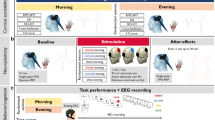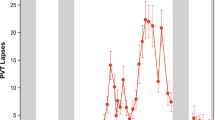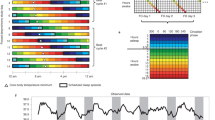Abstract
There are circadian (∼24 h) rhythms for a wide range of human physiological and psychological functions including mood and performance efficiency1. These rhythms are self-sustaining in conditions of temporal isolation, indicating that internal oscillators (or biological clocks) control them2. Recent research has proposed an endogenous two-oscillator model of the human circadian system, with one oscillator indicated by the core body temperature rhythm and a second oscillator responsible for the daily cycle of sleep and wakefulness3,4. The present study was designed to produce a desynchronization in period between the two oscillators, to assess directly the behaviour of the rhythms of different performance tasks. The results, reported here, indicate that a simple manual dexterity task is almost entirely under the control of the temperature rhythm oscillator, whereas a more complex cognitive task demonstrates a periodicity which appears to be influenced by those oscillators controlling temperature and the sleep/wake cycle.
This is a preview of subscription content, access via your institution
Access options
Subscribe to this journal
Receive 51 print issues and online access
$199.00 per year
only $3.90 per issue
Buy this article
- Purchase on Springer Link
- Instant access to full article PDF
Prices may be subject to local taxes which are calculated during checkout
Similar content being viewed by others
References
Conroy, R. T. W. L. & Mills, J. N. Human Circadian Rhythms (Churchill, London, 1970).
Weitzman, E. D. & Czeisler, C. A. Neurosecretion and Brain Peptides (eds Martin, J. B.,Reichlin, S. & Bick, K. L.) 475–499 (Raven, New York, 1981).
Wever, R. Int. J. Chronobiol. 3, 19–55 (1975).
Kronauer, R. E., Czeisler, C. A., Pilato, S. F., Moore-Ede, M. C. & Weitzman, E. D. Am. J. Physiol. 242, R3–R17 (1982).
Kleitman, N. & Jackson, D. P. J. appl. Physiol. 3, 309–328 (1950).
Colquhoun, W. P. Handbook of Behavioral Neurobiology (ed. Aschoff, J.) 333–348 (Plenum, New York, 1981).
Blake, M. J. F. Psychon. Sci. 9, 349–350 (1967).
Folkard, S. & Monk, T. H. Br. J. Psychol. 71, 295–307 (1980).
Folkard, S. & Monk, T. H. Psychophysiology 1980 (eds Sinz, R. & Rosenzwig, M. R.) 541–548 (Elsevier Biomedical, North Holland, 1982).
Weitzman, E. D., Czeisler, C. A., Zimmerman, J. C., Ronda, J. M. & Knauer, R. S. Sleeping and Waking Disorders (ed. Guilleminault, C.) 297–329 (Addison-Wesley, Menlo Park, 1982).
Baddeley, A. D. Psychon. Sci. 10, 341–342 (1968).
Folkard, S. Br. J. Psychol. 66, 1–8 (1975).
Monk, T. H. & Fort, A. Int. J. Chronobiol. 8, 193–222 (1983).
Fookson, J., Weitzman, E. D., Czeisler, C. A., Zimmerman, J. C. & Ronda, J. Proc. XV Int. Conf. of Int. Soc. for Chronobiol. (Karger, New York, 1981).
Monk, T. H. Biological Rhythms, Sleep and Performance (ed. Webb, W. B.) 27–57 (Wiley,Chichester, 1982).
Aschoff, J., Hoffman, K., Pohl, H. & Wever, R. Chronobiologia 2, 23–78 (1975).
Hughes, D. G. & Folkard, S. Nature 264, 432–434 (1976).
Author information
Authors and Affiliations
Rights and permissions
About this article
Cite this article
Monk, T., Weitzman, E., Fookson, J. et al. Task variables determine which biological clock controls circadian rhythms in human performance. Nature 304, 543–545 (1983). https://doi.org/10.1038/304543a0
Received:
Accepted:
Issue Date:
DOI: https://doi.org/10.1038/304543a0
This article is cited by
-
Circadian rhythms and memory formation
Nature Reviews Neuroscience (2010)
-
Pattern of shift rota modulates oral temperature circadian rhythm and sleep-wakefulness profiles in shift workers
Journal of Biosciences (1997)
-
Alteration of period and amplitude of circadian rhythms in shift workers
European Journal of Applied Physiology and Occupational Physiology (1988)
Comments
By submitting a comment you agree to abide by our Terms and Community Guidelines. If you find something abusive or that does not comply with our terms or guidelines please flag it as inappropriate.



